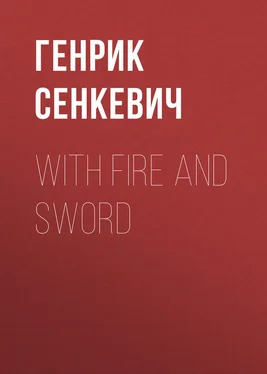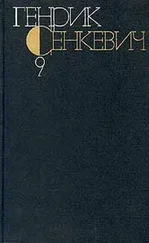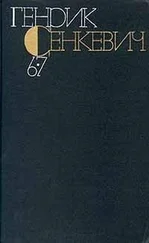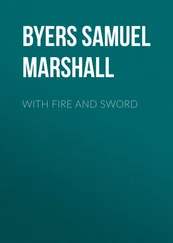Генрик Сенкевич - With Fire and Sword
Здесь есть возможность читать онлайн «Генрик Сенкевич - With Fire and Sword» — ознакомительный отрывок электронной книги совершенно бесплатно, а после прочтения отрывка купить полную версию. В некоторых случаях можно слушать аудио, скачать через торрент в формате fb2 и присутствует краткое содержание. Жанр: foreign_antique, foreign_prose, на английском языке. Описание произведения, (предисловие) а так же отзывы посетителей доступны на портале библиотеки ЛибКат.
- Название:With Fire and Sword
- Автор:
- Жанр:
- Год:неизвестен
- ISBN:нет данных
- Рейтинг книги:4 / 5. Голосов: 1
-
Избранное:Добавить в избранное
- Отзывы:
-
Ваша оценка:
- 80
- 1
- 2
- 3
- 4
- 5
With Fire and Sword: краткое содержание, описание и аннотация
Предлагаем к чтению аннотацию, описание, краткое содержание или предисловие (зависит от того, что написал сам автор книги «With Fire and Sword»). Если вы не нашли необходимую информацию о книге — напишите в комментариях, мы постараемся отыскать её.
With Fire and Sword — читать онлайн ознакомительный отрывок
Ниже представлен текст книги, разбитый по страницам. Система сохранения места последней прочитанной страницы, позволяет с удобством читать онлайн бесплатно книгу «With Fire and Sword», без необходимости каждый раз заново искать на чём Вы остановились. Поставьте закладку, и сможете в любой момент перейти на страницу, на которой закончили чтение.
Интервал:
Закладка:
But whoever should be alarmed at the sword would be reassured in a moment by a glance at the face of its owner. The face, lean like the whole person, was adorned with hanging brows and a pair of drooping, hemp-colored mustaches, but was as honest and sincere as the face of a child. The hanging mustaches and brows gave him an expression at once anxious, thoughtful, and ridiculous. He looked like a man whom people elbow aside; but he pleased Skshetuski from the first glance because of the sincerity of his face and his perfect soldierly self-control.
"Lieutenant," said he, "you are in the service of Prince Vishnyevetski?"
"I am."
The Lithuanian placed his hands together as if in prayer, and raised his eyes.
"Ah, what a mighty warrior, what a hero, what a leader!"
"God grant the Commonwealth as many such as possible!"
"But could I not enter his service?"
"He will be glad to have you."
At this point Zagloba interrupted the conversation.
"The prince will have two spits for his kitchen, – one in you, one in your sword, – or he will hire you as a cook, or he will order robbers to be hanged on you, or he will measure cloth with you to make uniforms! Tfu! why are you not ashamed as a man and a Catholic to be as long as a serpent or the lance of an infidel?"
"Oh, it's disgusting to hear you," said the Lithuanian, patiently.
"What is your title?" asked Skshetuski; "for when you were speaking Pan Zagloba interrupted so often that if you will pardon me-"
"Podbipienta."
"Povsinoga," added Zagloba.
"Zervikaptur of Myshikishki."
"Here, old woman, is fun for you. I drink his wine, but I'm a fool if these are not outlandish titles."
"Are you from Lithuania?" asked the lieutenant.
"Well, I'm two weeks now in Chigirin. Hearing from Pan Zatsvilikhovski that you were coming, I waited to present my request to the prince with his recommendation."
"Tell me, please, – for I am curious, – why do you carry such an executioner's sword under your arm?"
"It is not the sword of an executioner, Lieutenant, but of a Crusader, and I wear it because it is a trophy and has been long in my family. It served at Khoinitsi in Lithuanian hands, and that's why I wear it."
"But it's a savage machine, and must be terribly heavy. It's for two hands, I suppose?"
"Oh, it can be used in two hands or one."
"Let me have a look at it."
The Lithuanian drew the sword and handed it to him; but Skshetuski's arm dropped in a moment. He could neither point the weapon nor aim a blow freely. He tried with both hands; still it was heavy. Skshetuski was a little ashamed, and turning to those present, said, -
"Now, gentlemen, who can make a cross with it?"
"We have tried already," answered several voices. "Pan Zatsvilikhovski is the only man who raises it, but he can't make a cross with it."
"Well, let us see you, sir," said Skshetuski, turning to the Lithuanian.
Podbipienta raised the sword as if it were a cane, and whirled it several times with the greatest ease, till the air in the room whistled and a breeze was blowing on their faces.
"May God be your aid!" said Skshetuski. "You have sure service with the prince."
"God knows that I am anxious, and my sword will not rust in it."
"But what about your wits," asked Zagloba, "since you don't know how to use them?"
Zatsvilikhovski now rose, and with the lieutenant was preparing to go out, when a man with hair white as a dove entered, and seeing Zatsvilikhovski, said, -
"I have come here on purpose to see you, sir."
This was Barabash, the Colonel of Cherkasi.
"Then come to my quarters," replied Zatsvilikhovski. "There is such a smoke here that nothing can be seen."
They went out together, Skshetuski with them. As soon as he had crossed the threshold, Barabash asked, -
"Are there news of Hmelnitski?"
"There are. He has fled to the Saitch. This officer met him yesterday in the steppe."
"Then he has not gone by water? I hurried off a courier to Kudák to have him seized; but if what you say is true, 'tis useless."
When he had said this, Barabash covered his eyes with his hands, and began to repeat, "Oh, Christ save us! Christ save us!"
"Why are you disturbed?"
"Don't you know the treason he has wrought on me? Don't you know what it means to publish such documents in the Saitch? Christ save us! Unless the king makes war on the Mussulman, this will be a spark upon powder."
"You predict a rebellion?"
"I do not predict, I see it; and Hmelnitski is somewhat beyond Nalivaika and Loboda."
"But who will follow him?"
"Who? Zaporojians, registered Cossacks, people of the towns, the mob, cottagers, and such as these out here."
Barabash pointed to the market-square and to the people moving around upon it. The whole square was thronged with great gray oxen on the way to Korsún for the army; and with the oxen went a crowd of herdsmen (Chabani), who passed their whole lives in the steppe and Wilderness, – men perfectly wild, professing no religion, ("religionis nullius," as the Voevoda Kisel said). Among them were forms more like robbers than herdsmen, – fierce, terrible, covered with remnants of various garments. The greater part of them were dressed in sheepskin doublets or in untanned skins with the wool outside, open in front and showing, even in winter, the naked breast embrowned by the winds of the steppe. All were armed, but with the greatest variety of weapons. Some had bows and quivers on their shoulders; some muskets or "squealers" (so called by the Cossacks); some had Tartar sabres, some scythes; and finally, there were those who had only sticks with horse-jaws fastened on the ends. Among them mingled the no less wild, though better armed men from the lower country, taking to the camp for sale dried fish, game, and mutton fat. Farther on were the Chumaki (ox-drivers) with salt, bee-keepers from the steppes and forest, wax-bleachers with honey, forest-dwellers with tar and pitch, peasants with wagons, registered Cossacks, Tartars from Bélgorod, and God knows what tramps and "vampires" from the ends of the earth. The whole town was full of drunken men. Chigirin was the place of lodging, and therefore of a frolic before bedtime. Fires were scattered over the market-square, while here and there an empty tar-barrel was burning. From every point were heard cries and bustle. The shrill squeak of Tartar pipes and the sound of drums was mingled with the bellowing of cattle and the softer note of the lyre, to which old men sang the favorite song of the time, -
"Oh, bright falcon,
My own brother,
Thou soarest high,
Thou seest far."
And besides this went up the wild shouts "U-ha! u-ha!" of the Cossacks, smeared with tar and quite drunk, dancing the tropak on the square. All this was at once wild and frenzied. One glance was enough to convince Zatsvilikhovski that Barabash was right; that one breath was sufficient to let loose those chaotic elements, inclined to plunder and accustomed to violence, with which the whole Ukraine was filled. And behind these crowds stood the Saitch, the Zaporojie, recently bridled and put in curb after Masloff Stav, still gnawing the bit impatiently, remembering ancient privileges and hating commissioners, but forming an organized power. That power had also on its side the sympathy of a countless mass of peasants, less patient of control than in other parts of the Commonwealth, because near them was Chertomelik, and beyond lordlessness, booty, and freedom. The standard-bearer in view of this, though a Russian himself and a devoted adherent of Eastern orthodoxy, fell into gloomy thought.
Being an old man, he remembered well the times of Nalivaika, Loboda, and Krempski. He knew the robbers of the Ukraine better perhaps than any one in Russia; and knowing at the same time Hmelnitski, he knew that he was greater than twenty Lobodas and Nalivaikas. He understood, therefore, all the danger of his escape to the Saitch, especially with the letters of the king, which Barabash said were full of promises to the Cossacks and incitements to resistance.
Читать дальшеИнтервал:
Закладка:
Похожие книги на «With Fire and Sword»
Представляем Вашему вниманию похожие книги на «With Fire and Sword» списком для выбора. Мы отобрали схожую по названию и смыслу литературу в надежде предоставить читателям больше вариантов отыскать новые, интересные, ещё непрочитанные произведения.
Обсуждение, отзывы о книге «With Fire and Sword» и просто собственные мнения читателей. Оставьте ваши комментарии, напишите, что Вы думаете о произведении, его смысле или главных героях. Укажите что конкретно понравилось, а что нет, и почему Вы так считаете.












